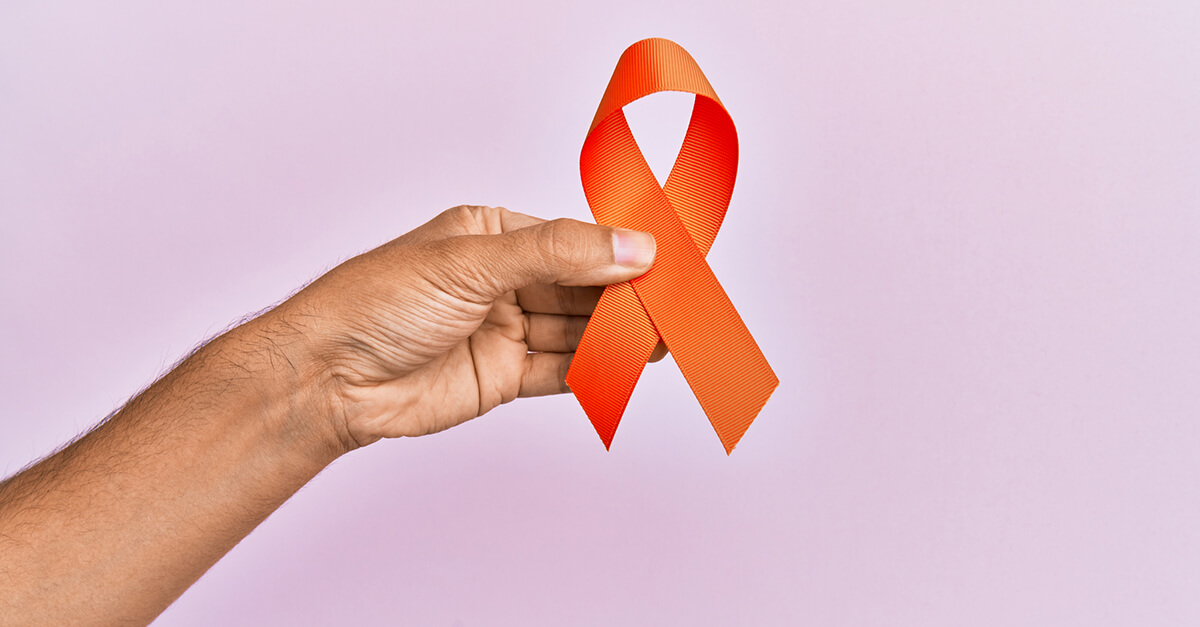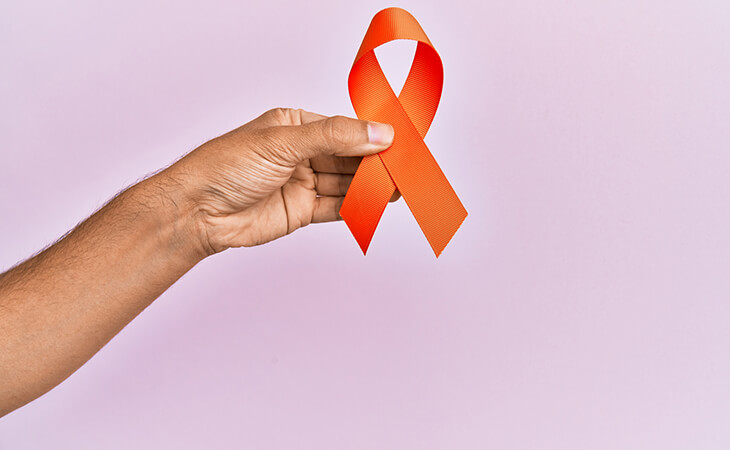5 tips when you're newly diagnosed with kidney cancer


This year more than 76,000 Americans will receive a kidney cancer diagnosis. The disease occurs when cells form cancerous tumors in one or both kidneys. Most people with kidney cancer (about 90%) develop renal cell carcinoma.
You’re far from alone if you receive this diagnosis. Kidney cancer is one of the 10 most common cancers affecting men and women in America. Still, a cancer diagnosis can be frightening. You’re sure to have questions and concerns about how the disease will affect your life now and in the future.
From the community: “I’m brand new to all of this; I found out a week ago about a 7cm mass in my right kidney. It doesn’t seem to have spread anywhere else yet, but is within a half cm of obstructing the veins. I met with a surgeon today, who said he has to remove the whole kidney. He’s going to do it laparoscopically, and says total recovery time will be 6 weeks and I’ll be able to drive in less than two. Does this match up with what everyone else experienced with surgery? Any pre or post surgery tips? Any suggestions on how I explain this to my 7 year old without completely freaking him out?” – Inspire member
What does it mean to have kidney cancer?
With early diagnosis and proper kidney cancer treatments, people with kidney cancer can expect excellent survival rates. As many as 3 in 4 people with kidney cancer are still alive five years after the initial diagnosis.
The kidney cancer stage — which parts of the body have cancer — factors into your prognosis. Cancer that affects only one kidney (stage 1 or localized cancer) tends to respond very well to treatments. About 2 in 3 people with kidney cancer have stage 1 cancer.
Cancer that spreads outside of the kidney tumor (called stage 4 or metastatic kidney cancer) is more difficult to treat. It’s also less common, accounting for approximately 16% of kidney cancer diagnoses. Kidney cancer typically spreads to the brains, bones, liver, lungs, and lymph nodes. About 13% of people with metastatic kidney cancer live five or more years after the diagnosis.
Your doctor will perform imaging tests like MRIs and CT scans to determine the cancer stage. These tests take place when you’re newly diagnosed with kidney cancer. You’ll get these same tests if the cancer spreads or returns (cancer recurrence) after treatments.
From the community: “Whirlwind of emotions these last few weeks. My mother is a nurse, healthy, marathon runner, strongest lady I know. December 6th wakes up with blood in her urine and goes to the ER. 7 centimeter tumor on her left kidney. She had a total nephrectomy on December 20th. Pathology came back RCC T3A. I’ve been trying to find more information on T3A but it is very confusing and scary to say the least. Good news is margins, adrenal gland, and lymph nodes were clear. But a chest CT also showed two spots on the outside of one lung. She has an appointment with an oncologist this month to schedule a biopsy… My family and I knew nothing about kidney cancer until a few weeks ago and navigating this has been extremely difficult and sudden… I have no idea what the outlook is or how concerned we should be. The doctor said he was very concerned about the spots on her lungs but even if they are the RCC, he has had patients with much worse presentations than my mom who did great with treatment. Part of my anxiety come from not knowing... It’s this scary duality of knowing what is coming for her in the next few months and years but not really knowing.” – Inspire member
Why did I get kidney cancer?
Doctors still don’t know why some people get kidney cancer while others do not. Your chances of getting kidney cancer increase with age. Men and Black people seem to have a higher risk.
These factors can also increase your risk:
chronic kidney disease and hereditary kidney conditions
dialysis
excess weight
exposure to toxic substances like cadmium
family history of kidney cancer
high blood pressure
overuse of pain medicines or diuretics
smoking
What are my next steps after a kidney cancer diagnosis?
A kidney cancer diagnosis can turn your world upside down. Disease symptoms and treatment side effects like fatigue, pain, and nausea can affect your physical and mental health.
But you can take certain steps to be more in control of your situation:
start palliative care
eat a kidney-friendly diet
take care of your mental health
consider clinical trials
get a survivorship plan in place
Start palliative care
Palliative care can benefit anyone with a chronic illness. It isn’t the same as hospice, which is for people who are nearing the end of life. Palliative care specialists work together to improve your quality of life through better symptom management. In addition to making you more comfortable, research indicates that palliative care may add years to your life when you have cancer.
Eat a kidney-friendly diet
Foods that are high in protein, phosphorous, and potassium can make diseased kidneys work harder to filter out wastes from the blood. A kidney-friendly diet supports healthy kidney function while giving your body the fuel it needs to fight cancer and infections.
From the community: “A month ago, a lump appeared on my abdomen. It was not painful. Just concerning. My primary care doctor felt it was a lipoma but wanted to be sure and sent me for an ultrasound. The lump was a lipoma. But the ultrasound showed two cysts on my kidney, next was an MRI, which showed a 2.3 lesion on my left kidney. A biopsy was next, and the results came back RCC. I have no symptoms. which is baffling. I'm now awaiting an appointment with the an oncologist/surgeon in the next week. I have type 2 diabetes. It is well controlled. I'm not certain what the treatment plan will be, my primary care doctor, thinks removal of the kidney will be required. I was wondering how long it has taken people to recover from surgery? And what can I expect from surgery, in terms of the challenges of recovery? I just started a new job 3 months ago in which travel is required from time to time.” – Inspire member
Take care of your mental health
It’s estimated that 1 in 4 people with cancer develop depression. This mood disorder can keep you from enjoying life. It can also have a negative effect on your relationships and ability to work. You may feel anxious about your health, finances, and the cancer’s impact on loved ones.
It can be helpful to confide in a friend or relative. You may also benefit from talking to a mental health professional like a psychologist or social worker. These specialists can help you find healthy ways to navigate these uncertain times. They can also help you improve communication with loved ones, so you get the support and help you need. Talking to a therapist or a trusted friend can help you work through the many emotions you’re experiencing.
There are many ways to support your mental health. You can:
see a mental health professional like a psychiatrist, psychologist, or social worker
connect with a trusted friend or family member
join an in-person or online support group like the Kidney Cancer Association’s community on Inspire
learn stress-relieving techniques like deep breathing exercises, mindfulness, or meditation
immerse yourself in uplifting activities like gardening, volunteering, or a hobby like painting or singing
take medications like antidepressants, if needed
talk to a clergy member
From the community: “I was diagnosed a few months ago after a scan of my lungs when I got Covid. They saw a mass on my right kidney and I needed to do another scan with a contrast solution injected in me. I was then referred to a urologist surgeon because the tumour was 6 cm and was close to the main arteries. We decided to have the kidney totally removed. Because I am overweight they needed to do an open surgery instead of keyhole. I have struggled with so many emotions surrounding the diagnosis etc. I have a strong faith in God so that helped me in spite of my questions. I was operated on May 3rd and returned home May 7th. Because of the incision with 38 staples and 5 stitches it has been a longer healing process and 2 areas have not totally closed up yet...” – Inspire member
Consider clinical trials
If you have metastatic kidney cancer or an aggressive cancer, talk to your doctor to see if you’re a good candidate for a clinical trial. These treatment studies allow you to try promising new therapies that are still under development.
In recent years, clinical trial successes have led to the approval of several new kidney cancer treatments.
Get a survivorship plan in place
Your doctor or cancer center can provide you with a cancer survivorship care plan. This plan records information about your cancer history, including details about the diagnosis and treatments. It also outlines important follow-up tests you need and when to get them.
Having a cancer survivorship care plan in place when you finish treatment can help ease some of the anxiety that you may have about the cancer coming back or spreading. By providing a copy to your primary care physician, you can both keep track of upcoming tests and be more aware of signs that may indicate cancer recurrence or metastases.
A care plan helps you learn more about:
short-term and long-term treatment side effects
signs of kidney cancer spread or recurrence
tips for improving and protecting your health
Sources
Depression. American Cancer Society. February 2020.
Key statistics about kidney cancer. American Cancer Society. January 2021.
Living as a kidney cancer survivor. American Cancer Society. June 2020.
Risk factors for kidney cancer. American Cancer Society. February 2020.
Survival rates for kidney cancer. American Cancer Society. January 2021.
What is kidney cancer? American Cancer Society. May 2020.
Cancer survivorship care plans. Centers for Disease Control and Prevention. May 2020.
Cancer stat facts: Kidney and renal pelvis cancer. National Cancer Institute.
Parikh RB, et al. Early specialty palliative care: Translating data in oncology into practice. New England Journal of Medicine. December 2013.
Disclaimer
Member comments are lightly edited for length and to remove identifying information but are otherwise reproduced as they appear in the community as part of public posts.
This content is for general informational purposes only and does not necessarily reflect the views and opinions of any organization or individual. The content should not be used as a substitute for professional medical advice, diagnosis, or treatment. Please consult your healthcare provider about any questions you may have regarding a medical condition.




